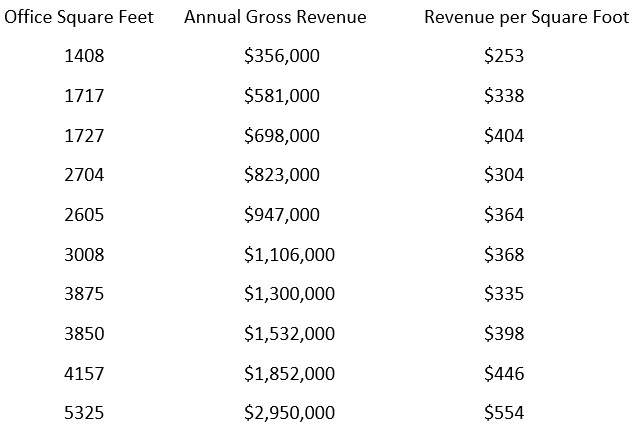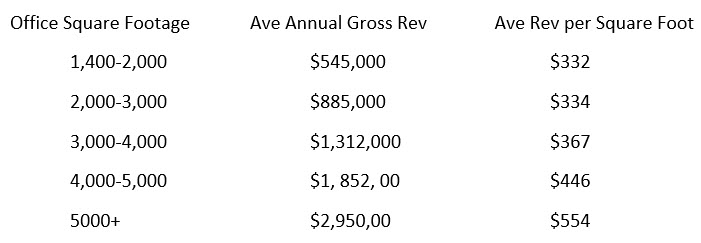By Ken Krivacic, OD, MBA

April 28, 2021
How do you know when it’s time to expand your practice? Many practice owners ask this question as they see their practice grow. Is there a right time to enlarge your facility? Do you need to move?
In my 30+ years in practice we faced this dilemma numerous times and ended up moving to a larger facility fours times or almost once every 10 years. Moving and expanding can be costly and you don’t want to make that move without a positive return.
So, how do you know when it’s time to expand or move? And how do you know if you can afford to move? In this article we will explore the signs that indicate an expansion is in order. We will also use financial data to help determine if an expansion is affordable and will bring an expected return on investment.
Is Expansion Right for Me?
The first question you need to ask is if expansion is right for you. Growth and expansion inherently carry risk both financially and from the perspective of added stress in your life. You must ask yourself if you are ready to take on the challenge.
You may want to consider alternatives to expansion. If your space is limiting how many patients you can see per day, what about expanding hours? If you don’t already work evenings or weekends, could you? If you don’t want to work more, how about adding another doctor, and if space does not permit doing so, what about alternating schedules? Instead of working 8 a.m. to 5 p.m., how about two shifts one from 7 a.m. to 1 p.m. and the other from 1 p.m. to 7 p.m.? Of course, these options have their own challenges. Do you have enough staff to cover the extra hours? Can you easily and reliably hire enough good staff to cover the extra hours?
In the Entrepreneur magazine article, “Should I Expand My Business?” Dominec Rinaldi asks, “Will I really benefit from expansion?” In response, he writes,“There are several benefits that could come with business expansion, but there is also a lot of assumed risk.”
Other points to consider:
• Economies of scale: Will expansion result in any cost advantages for your business?
• Customer base: Will expansion expose you to new customers? And will your existing customers remain loyal while you work through any growing pains?
• Yourself: Will expansion bring unavoidable stress into your life that could potentially deter your ability to successfully operate the business under the new expansion?”
How can we tell if our practice is ready for expansion? There can be several clues to guide you in your decision. Michael Jones, a senior editor for Funding Circle, lists “Six Signs You’re Ready to Expand Your Business”:
1. You Have a Strong Team
Without a strong management team and passionate, reliable employees, a great concept and high sales don’t necessarily spell success. Expansion puts significant stress on your business and will require that you increasingly give up direct control. Are you prepared to trust your team with more decisions, and are they ready for what you’re entrusting them with? Will they be by your side in three or five years? Consider who’s moving forward with you and who you can’t move forward without.
Other Articles to Explore
2. Your Patients Love You
Your patients can tell you a lot about whether you’re ready to expand your small business. One way is by literally telling you to expand! If multiple patients are asking you to open a new location or expand your services, you can be sure you have demand and a loyal patient base to rely on. Another way they can indicate you’re ready for expansion is by what they do. Do customers seek you out on their own? Do they come back time and again? These are all strong indications that your business might be ready for growth.
3. You’re Bursting at the Seams
If demand for your products or services is exceeding your capacity, you may be ready to expand soon. If your office is becoming too cramped to breathe in, you may need to! First make sure that demand is high for many months in a row, not just as a temporary spike. Likewise, have the pieces of the puzzle in place before you make any decisions based solely on demand.
4. You Have the Money
That means enough revenue, profits, cash flow and financing. You’ll need sufficient money to carry you through the ramp-up phase of your expansion, which usually means unforeseen costs and investments that won’t see returns for a long time. You need to be profitable for a few years and have sufficient cash flow to carry your business through a successful expansion, whether or not you receive financing.
5. Your Plans Are Proven
If you can attribute your current success in part to setting up goals and achieving them systematically, you may be ready to take on the complex task of expanding. Reaching milestones on time or ahead of schedule is a good indication that your planning skills and business model are strong enough for new challenges. While planning for expansion, you should of course be making sure your industry or market’s growth is favorable, and that you have a detailed marketing and sales plan for the new market you’ll be dealing with.
6. You Have Systems in Place
If you couldn’t (hypothetically) hand over the operations of your small business to someone else, it may not be the right time for expansion. If your sales doubled tomorrow, is your team ready to handle the new demands? Have you thought through where to store extra inventory? If you needed to hire three new people next week, would they have a training manual to guide them? Even with great documented systems in place, you will have to work twice as hard at the beginning of an expansion. Make sure the transition isn’t any rougher for you or your team than it needs to be.
I didn’t know it at the time, but when we moved and expanded, we were relying on some or all of the six signs which Jones lists. It’s also not an accident that he lists a strong team as number one on his list. Expanding and moving is stressful, and a strong and successful team will make the process that much easier. You don’t want to have to go it alone.
Financial Metrics to Aid in Your Decision-Making
One reason to expand is for the financial benefit of a larger office space. A larger space generally generates more income, and if you manage the extra income correctly, that translates into an increased net to the practice. How can you estimate the additional income that would offset the additional expense?
One way to gauge if expansion will work for you is to see if it works for others. Essilor’s ECP University provides such metrics from private practices in the U.S. Their latest report published in 2018 showed the breakdown of Revenue per Square Foot by Practice Size. Below is a table of their findings:

If we break those numbers into segments, we can see that larger jumps in square footage usually show larger jumps in revenue. Let’s look at it by a range:

The numbers above reflect what my own experience was in growing our practice. We started with one doctor and 1,200 sq. ft., then went to two doctors and 2,200 sq. ft. and then two doctors and 3,500 sq. ft. and then finally three doctors and 5,300 sq. ft. In each case the revenue increased with the size of the square footage. Even though net percentage to the practice did not increase, the actual net dollars did due to the percentage from a larger pie.
One caveat is that the increase was not immediate. There is a lag to get up to speed. That lag includes getting enough staff to handle the increase and the added expenses initially with construction costs and added inventory costs. Make sure before you make the move to expand that you are in good financial shape. My rule of thumb is that an optometric practice needs about 1,500 sq. ft. for each doctor.
Finally, don’t fear expansion. Yes, it has its trepidation with increased expense and stress, but if you are patient, the rewards will be satisfying.
 Ken Krivacic, OD, MBA, practices at Las Colinas Vision Center in Irving, Texas. To contact him: kkrivacic@aol.com.
Ken Krivacic, OD, MBA, practices at Las Colinas Vision Center in Irving, Texas. To contact him: kkrivacic@aol.com.

























